DAM792 - Rotorua Canopy Tours: Sustainable Practices in New Zealand
VerifiedAdded on 2023/03/30
|23
|4424
|338
Report
AI Summary
This report provides an executive summary of Rotorua Canopy Tours, a New Zealand-based adventure tourism company, and analyzes its sustainable practices within the context of the New Zealand tourism sustainability commitment. A literature review explores key sustainability components (social, environmental, and economic) and evaluates sustainability approaches based on economic, visitor, host community, and environmental factors. The report examines Rotorua Canopy Tours' sustainable practices related to economic commitment (sustainable businesses, capital investment), visitor commitment (product and market development, visitor engagement), host community commitment (sustainable employment, community engagement), and environmental commitment (waste management, education). The conclusion summarizes the four key elements, provides an evaluation, and offers recommendations for finance building, change management, and media engagement to further enhance the company's sustainability efforts. Desklib offers a wide range of academic resources, including similar reports and past papers, to aid students in their studies.
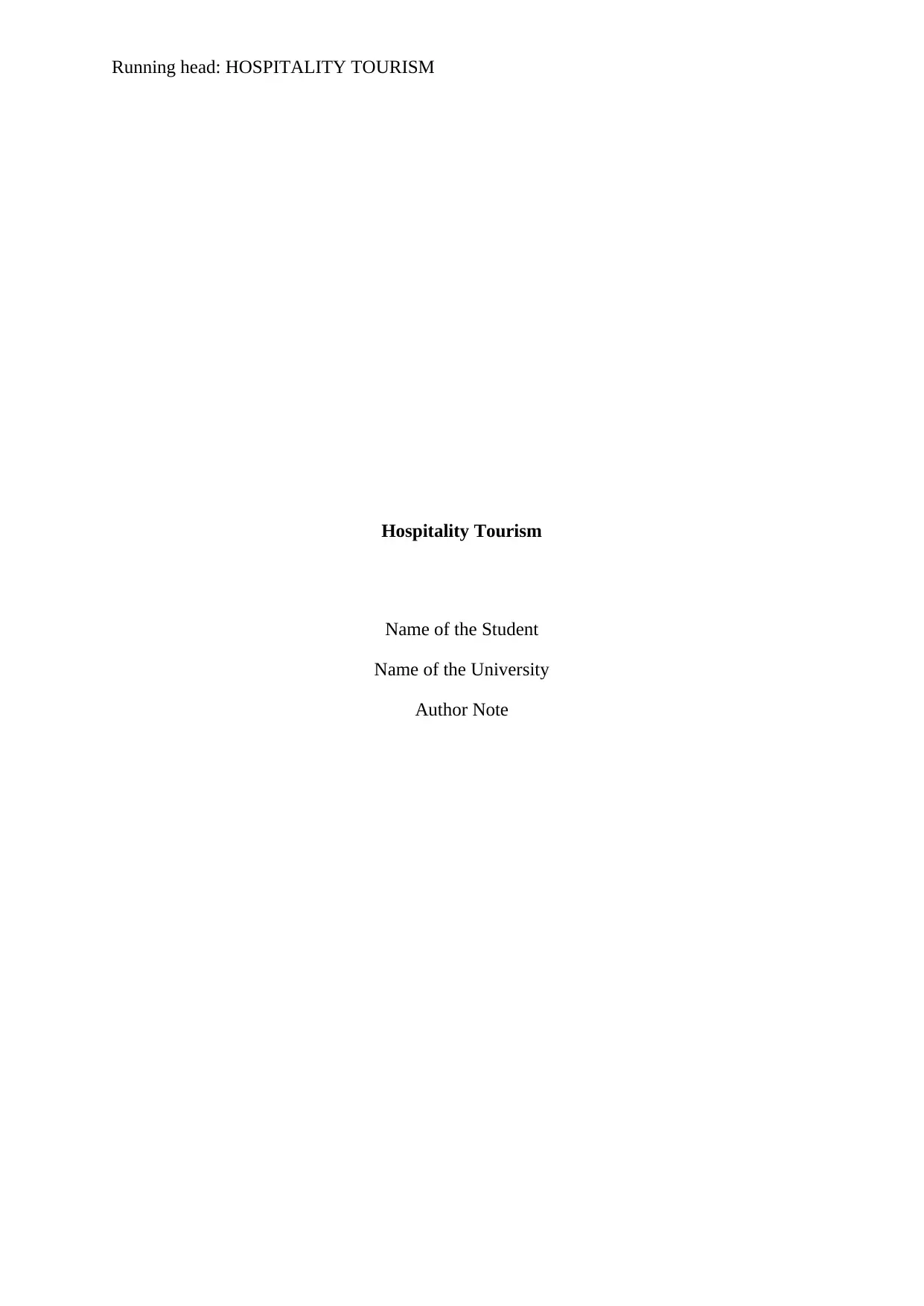
Running head: HOSPITALITY TOURISM
Hospitality Tourism
Name of the Student
Name of the University
Author Note
Hospitality Tourism
Name of the Student
Name of the University
Author Note
Paraphrase This Document
Need a fresh take? Get an instant paraphrase of this document with our AI Paraphraser
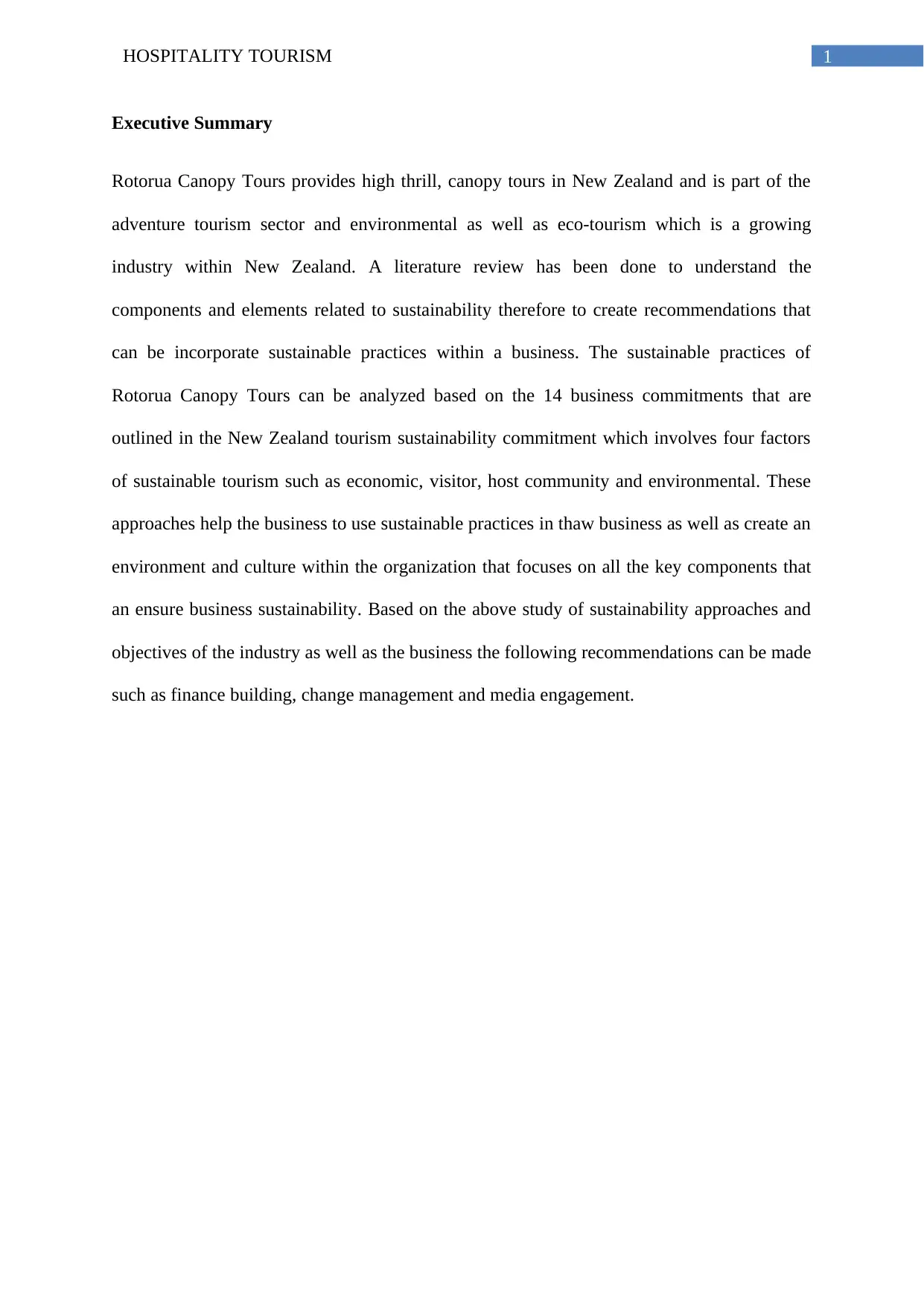
1HOSPITALITY TOURISM
Executive Summary
Rotorua Canopy Tours provides high thrill, canopy tours in New Zealand and is part of the
adventure tourism sector and environmental as well as eco-tourism which is a growing
industry within New Zealand. A literature review has been done to understand the
components and elements related to sustainability therefore to create recommendations that
can be incorporate sustainable practices within a business. The sustainable practices of
Rotorua Canopy Tours can be analyzed based on the 14 business commitments that are
outlined in the New Zealand tourism sustainability commitment which involves four factors
of sustainable tourism such as economic, visitor, host community and environmental. These
approaches help the business to use sustainable practices in thaw business as well as create an
environment and culture within the organization that focuses on all the key components that
an ensure business sustainability. Based on the above study of sustainability approaches and
objectives of the industry as well as the business the following recommendations can be made
such as finance building, change management and media engagement.
Executive Summary
Rotorua Canopy Tours provides high thrill, canopy tours in New Zealand and is part of the
adventure tourism sector and environmental as well as eco-tourism which is a growing
industry within New Zealand. A literature review has been done to understand the
components and elements related to sustainability therefore to create recommendations that
can be incorporate sustainable practices within a business. The sustainable practices of
Rotorua Canopy Tours can be analyzed based on the 14 business commitments that are
outlined in the New Zealand tourism sustainability commitment which involves four factors
of sustainable tourism such as economic, visitor, host community and environmental. These
approaches help the business to use sustainable practices in thaw business as well as create an
environment and culture within the organization that focuses on all the key components that
an ensure business sustainability. Based on the above study of sustainability approaches and
objectives of the industry as well as the business the following recommendations can be made
such as finance building, change management and media engagement.
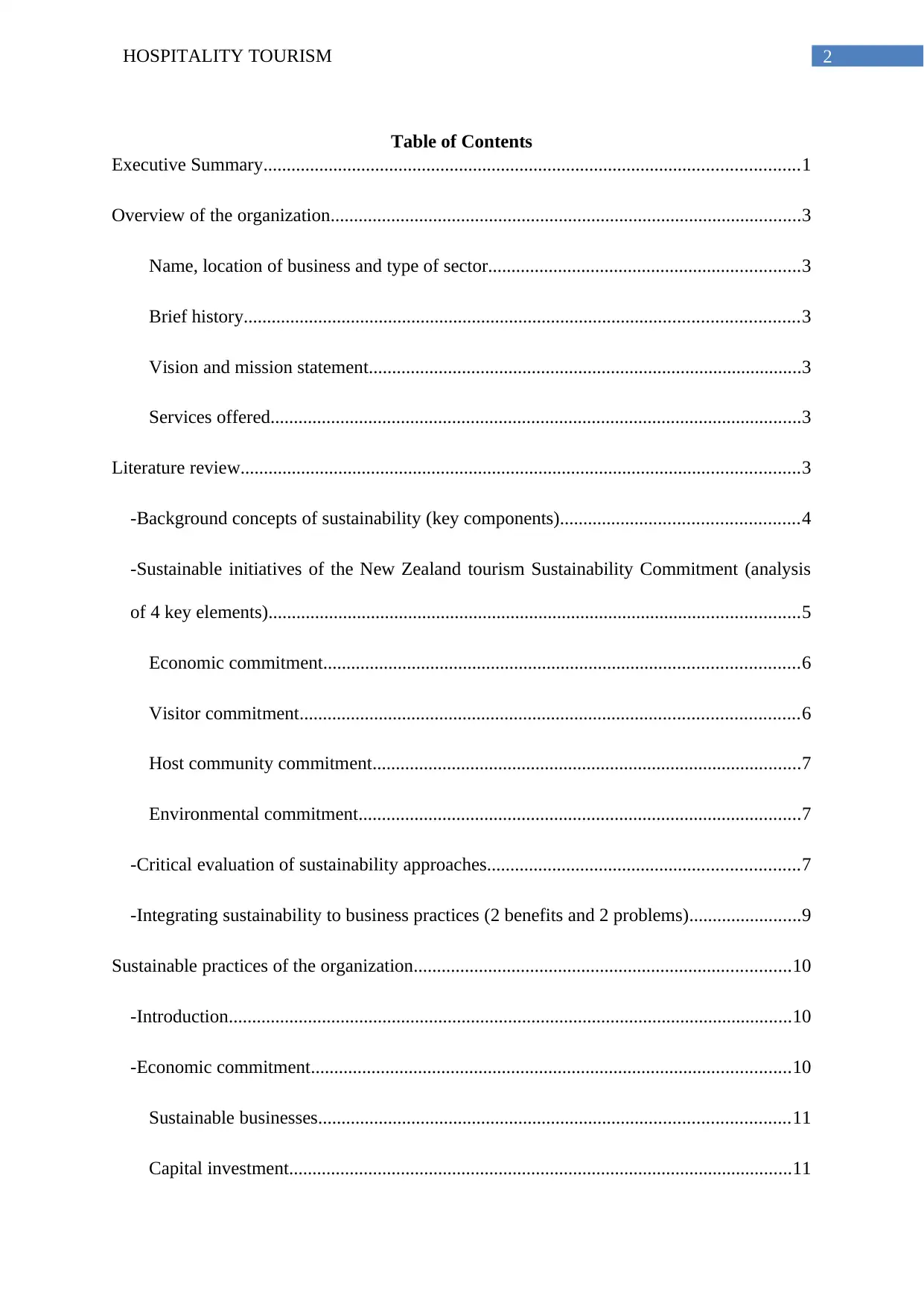
2HOSPITALITY TOURISM
Table of Contents
Executive Summary...................................................................................................................1
Overview of the organization.....................................................................................................3
Name, location of business and type of sector...................................................................3
Brief history.......................................................................................................................3
Vision and mission statement.............................................................................................3
Services offered..................................................................................................................3
Literature review........................................................................................................................3
-Background concepts of sustainability (key components)...................................................4
-Sustainable initiatives of the New Zealand tourism Sustainability Commitment (analysis
of 4 key elements)..................................................................................................................5
Economic commitment......................................................................................................6
Visitor commitment...........................................................................................................6
Host community commitment............................................................................................7
Environmental commitment...............................................................................................7
-Critical evaluation of sustainability approaches...................................................................7
-Integrating sustainability to business practices (2 benefits and 2 problems)........................9
Sustainable practices of the organization.................................................................................10
-Introduction.........................................................................................................................10
-Economic commitment.......................................................................................................10
Sustainable businesses.....................................................................................................11
Capital investment............................................................................................................11
Table of Contents
Executive Summary...................................................................................................................1
Overview of the organization.....................................................................................................3
Name, location of business and type of sector...................................................................3
Brief history.......................................................................................................................3
Vision and mission statement.............................................................................................3
Services offered..................................................................................................................3
Literature review........................................................................................................................3
-Background concepts of sustainability (key components)...................................................4
-Sustainable initiatives of the New Zealand tourism Sustainability Commitment (analysis
of 4 key elements)..................................................................................................................5
Economic commitment......................................................................................................6
Visitor commitment...........................................................................................................6
Host community commitment............................................................................................7
Environmental commitment...............................................................................................7
-Critical evaluation of sustainability approaches...................................................................7
-Integrating sustainability to business practices (2 benefits and 2 problems)........................9
Sustainable practices of the organization.................................................................................10
-Introduction.........................................................................................................................10
-Economic commitment.......................................................................................................10
Sustainable businesses.....................................................................................................11
Capital investment............................................................................................................11
⊘ This is a preview!⊘
Do you want full access?
Subscribe today to unlock all pages.

Trusted by 1+ million students worldwide
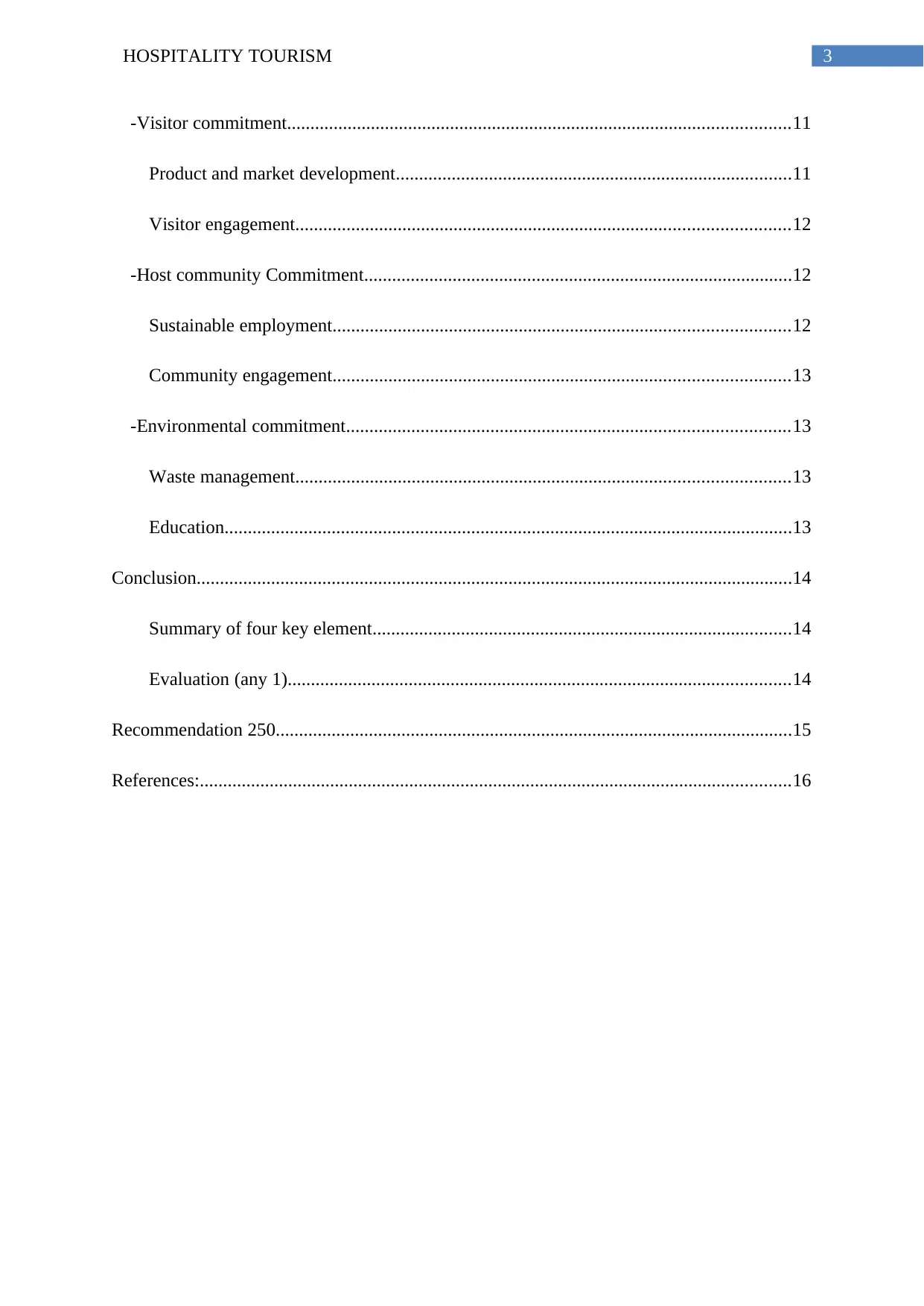
3HOSPITALITY TOURISM
-Visitor commitment............................................................................................................11
Product and market development.....................................................................................11
Visitor engagement..........................................................................................................12
-Host community Commitment............................................................................................12
Sustainable employment..................................................................................................12
Community engagement..................................................................................................13
-Environmental commitment...............................................................................................13
Waste management..........................................................................................................13
Education..........................................................................................................................13
Conclusion................................................................................................................................14
Summary of four key element..........................................................................................14
Evaluation (any 1)............................................................................................................14
Recommendation 250...............................................................................................................15
References:...............................................................................................................................16
-Visitor commitment............................................................................................................11
Product and market development.....................................................................................11
Visitor engagement..........................................................................................................12
-Host community Commitment............................................................................................12
Sustainable employment..................................................................................................12
Community engagement..................................................................................................13
-Environmental commitment...............................................................................................13
Waste management..........................................................................................................13
Education..........................................................................................................................13
Conclusion................................................................................................................................14
Summary of four key element..........................................................................................14
Evaluation (any 1)............................................................................................................14
Recommendation 250...............................................................................................................15
References:...............................................................................................................................16
Paraphrase This Document
Need a fresh take? Get an instant paraphrase of this document with our AI Paraphraser
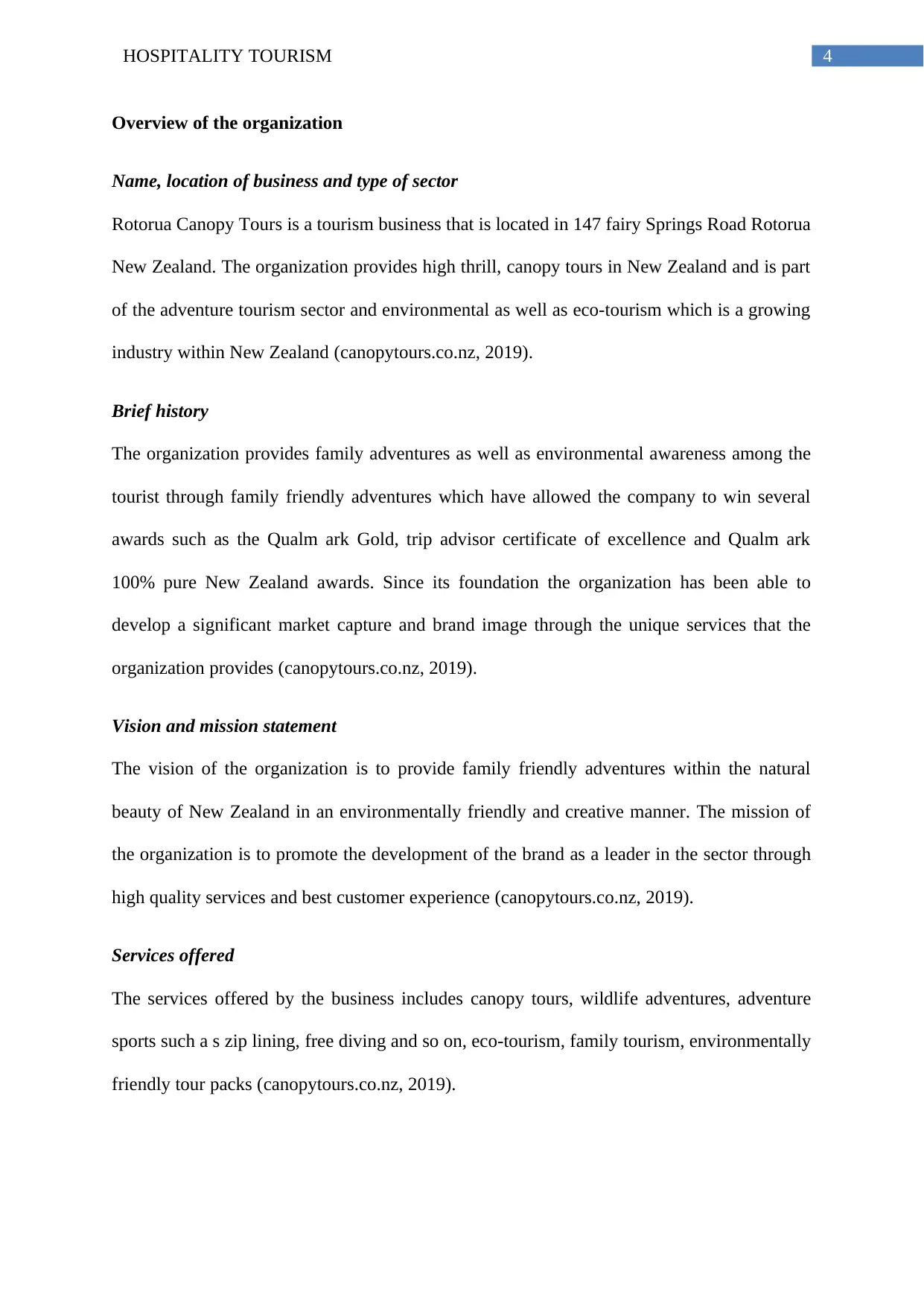
4HOSPITALITY TOURISM
Overview of the organization
Name, location of business and type of sector
Rotorua Canopy Tours is a tourism business that is located in 147 fairy Springs Road Rotorua
New Zealand. The organization provides high thrill, canopy tours in New Zealand and is part
of the adventure tourism sector and environmental as well as eco-tourism which is a growing
industry within New Zealand (canopytours.co.nz, 2019).
Brief history
The organization provides family adventures as well as environmental awareness among the
tourist through family friendly adventures which have allowed the company to win several
awards such as the Qualm ark Gold, trip advisor certificate of excellence and Qualm ark
100% pure New Zealand awards. Since its foundation the organization has been able to
develop a significant market capture and brand image through the unique services that the
organization provides (canopytours.co.nz, 2019).
Vision and mission statement
The vision of the organization is to provide family friendly adventures within the natural
beauty of New Zealand in an environmentally friendly and creative manner. The mission of
the organization is to promote the development of the brand as a leader in the sector through
high quality services and best customer experience (canopytours.co.nz, 2019).
Services offered
The services offered by the business includes canopy tours, wildlife adventures, adventure
sports such a s zip lining, free diving and so on, eco-tourism, family tourism, environmentally
friendly tour packs (canopytours.co.nz, 2019).
Overview of the organization
Name, location of business and type of sector
Rotorua Canopy Tours is a tourism business that is located in 147 fairy Springs Road Rotorua
New Zealand. The organization provides high thrill, canopy tours in New Zealand and is part
of the adventure tourism sector and environmental as well as eco-tourism which is a growing
industry within New Zealand (canopytours.co.nz, 2019).
Brief history
The organization provides family adventures as well as environmental awareness among the
tourist through family friendly adventures which have allowed the company to win several
awards such as the Qualm ark Gold, trip advisor certificate of excellence and Qualm ark
100% pure New Zealand awards. Since its foundation the organization has been able to
develop a significant market capture and brand image through the unique services that the
organization provides (canopytours.co.nz, 2019).
Vision and mission statement
The vision of the organization is to provide family friendly adventures within the natural
beauty of New Zealand in an environmentally friendly and creative manner. The mission of
the organization is to promote the development of the brand as a leader in the sector through
high quality services and best customer experience (canopytours.co.nz, 2019).
Services offered
The services offered by the business includes canopy tours, wildlife adventures, adventure
sports such a s zip lining, free diving and so on, eco-tourism, family tourism, environmentally
friendly tour packs (canopytours.co.nz, 2019).
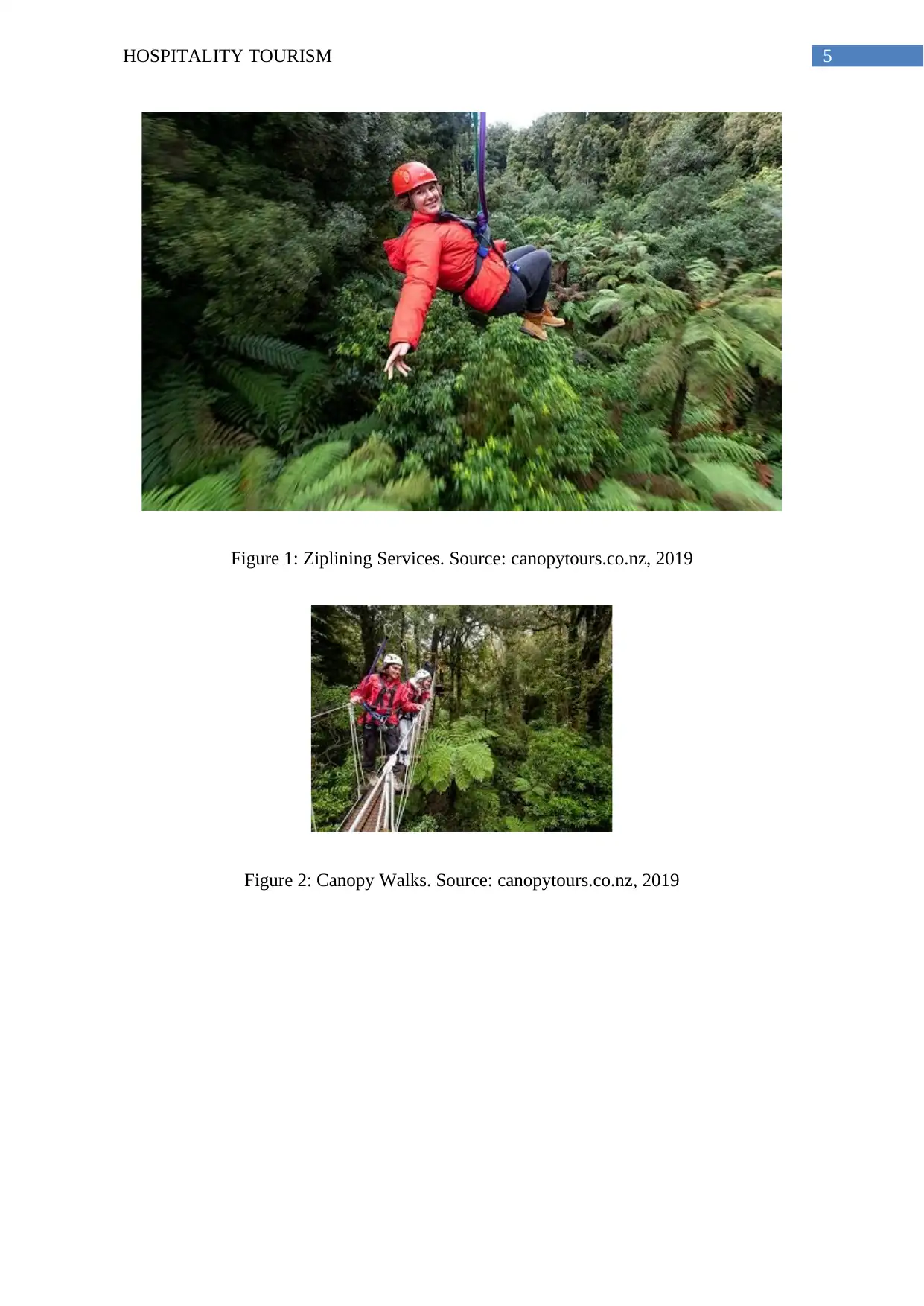
5HOSPITALITY TOURISM
Figure 1: Ziplining Services. Source: canopytours.co.nz, 2019
Figure 2: Canopy Walks. Source: canopytours.co.nz, 2019
Figure 1: Ziplining Services. Source: canopytours.co.nz, 2019
Figure 2: Canopy Walks. Source: canopytours.co.nz, 2019
⊘ This is a preview!⊘
Do you want full access?
Subscribe today to unlock all pages.

Trusted by 1+ million students worldwide
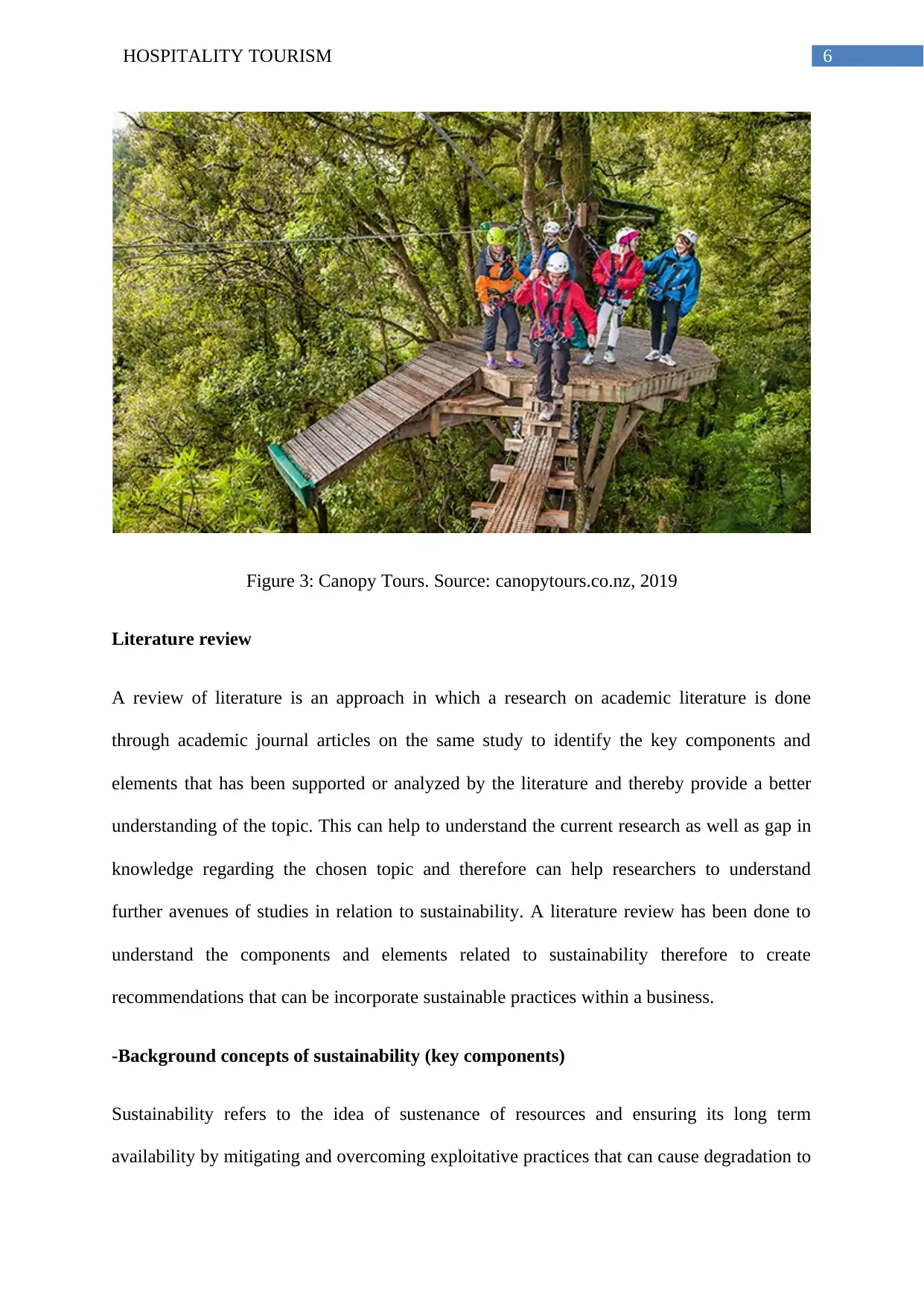
6HOSPITALITY TOURISM
Figure 3: Canopy Tours. Source: canopytours.co.nz, 2019
Literature review
A review of literature is an approach in which a research on academic literature is done
through academic journal articles on the same study to identify the key components and
elements that has been supported or analyzed by the literature and thereby provide a better
understanding of the topic. This can help to understand the current research as well as gap in
knowledge regarding the chosen topic and therefore can help researchers to understand
further avenues of studies in relation to sustainability. A literature review has been done to
understand the components and elements related to sustainability therefore to create
recommendations that can be incorporate sustainable practices within a business.
-Background concepts of sustainability (key components)
Sustainability refers to the idea of sustenance of resources and ensuring its long term
availability by mitigating and overcoming exploitative practices that can cause degradation to
Figure 3: Canopy Tours. Source: canopytours.co.nz, 2019
Literature review
A review of literature is an approach in which a research on academic literature is done
through academic journal articles on the same study to identify the key components and
elements that has been supported or analyzed by the literature and thereby provide a better
understanding of the topic. This can help to understand the current research as well as gap in
knowledge regarding the chosen topic and therefore can help researchers to understand
further avenues of studies in relation to sustainability. A literature review has been done to
understand the components and elements related to sustainability therefore to create
recommendations that can be incorporate sustainable practices within a business.
-Background concepts of sustainability (key components)
Sustainability refers to the idea of sustenance of resources and ensuring its long term
availability by mitigating and overcoming exploitative practices that can cause degradation to
Paraphrase This Document
Need a fresh take? Get an instant paraphrase of this document with our AI Paraphraser
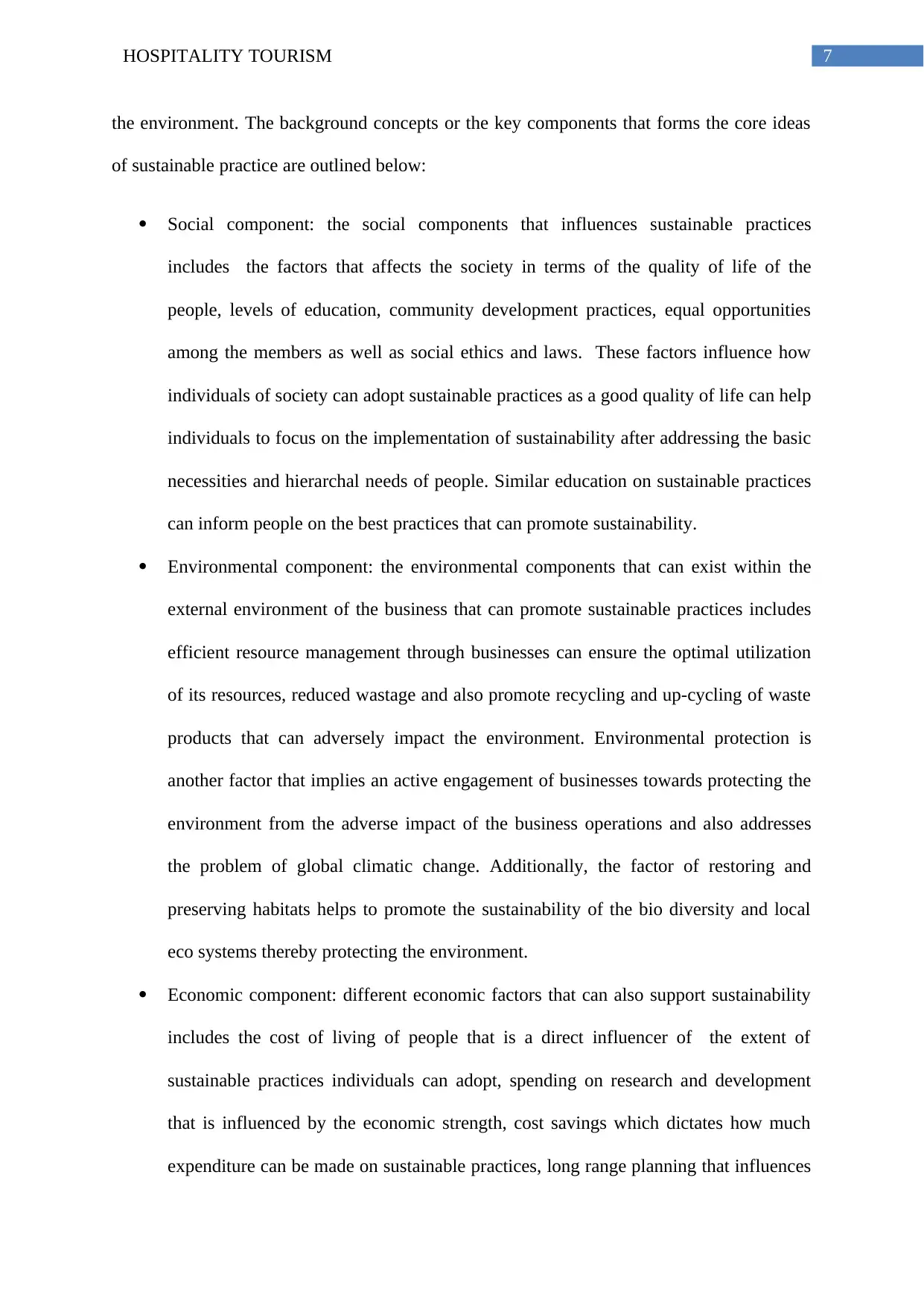
7HOSPITALITY TOURISM
the environment. The background concepts or the key components that forms the core ideas
of sustainable practice are outlined below:
Social component: the social components that influences sustainable practices
includes the factors that affects the society in terms of the quality of life of the
people, levels of education, community development practices, equal opportunities
among the members as well as social ethics and laws. These factors influence how
individuals of society can adopt sustainable practices as a good quality of life can help
individuals to focus on the implementation of sustainability after addressing the basic
necessities and hierarchal needs of people. Similar education on sustainable practices
can inform people on the best practices that can promote sustainability.
Environmental component: the environmental components that can exist within the
external environment of the business that can promote sustainable practices includes
efficient resource management through businesses can ensure the optimal utilization
of its resources, reduced wastage and also promote recycling and up-cycling of waste
products that can adversely impact the environment. Environmental protection is
another factor that implies an active engagement of businesses towards protecting the
environment from the adverse impact of the business operations and also addresses
the problem of global climatic change. Additionally, the factor of restoring and
preserving habitats helps to promote the sustainability of the bio diversity and local
eco systems thereby protecting the environment.
Economic component: different economic factors that can also support sustainability
includes the cost of living of people that is a direct influencer of the extent of
sustainable practices individuals can adopt, spending on research and development
that is influenced by the economic strength, cost savings which dictates how much
expenditure can be made on sustainable practices, long range planning that influences
the environment. The background concepts or the key components that forms the core ideas
of sustainable practice are outlined below:
Social component: the social components that influences sustainable practices
includes the factors that affects the society in terms of the quality of life of the
people, levels of education, community development practices, equal opportunities
among the members as well as social ethics and laws. These factors influence how
individuals of society can adopt sustainable practices as a good quality of life can help
individuals to focus on the implementation of sustainability after addressing the basic
necessities and hierarchal needs of people. Similar education on sustainable practices
can inform people on the best practices that can promote sustainability.
Environmental component: the environmental components that can exist within the
external environment of the business that can promote sustainable practices includes
efficient resource management through businesses can ensure the optimal utilization
of its resources, reduced wastage and also promote recycling and up-cycling of waste
products that can adversely impact the environment. Environmental protection is
another factor that implies an active engagement of businesses towards protecting the
environment from the adverse impact of the business operations and also addresses
the problem of global climatic change. Additionally, the factor of restoring and
preserving habitats helps to promote the sustainability of the bio diversity and local
eco systems thereby protecting the environment.
Economic component: different economic factors that can also support sustainability
includes the cost of living of people that is a direct influencer of the extent of
sustainable practices individuals can adopt, spending on research and development
that is influenced by the economic strength, cost savings which dictates how much
expenditure can be made on sustainable practices, long range planning that influences
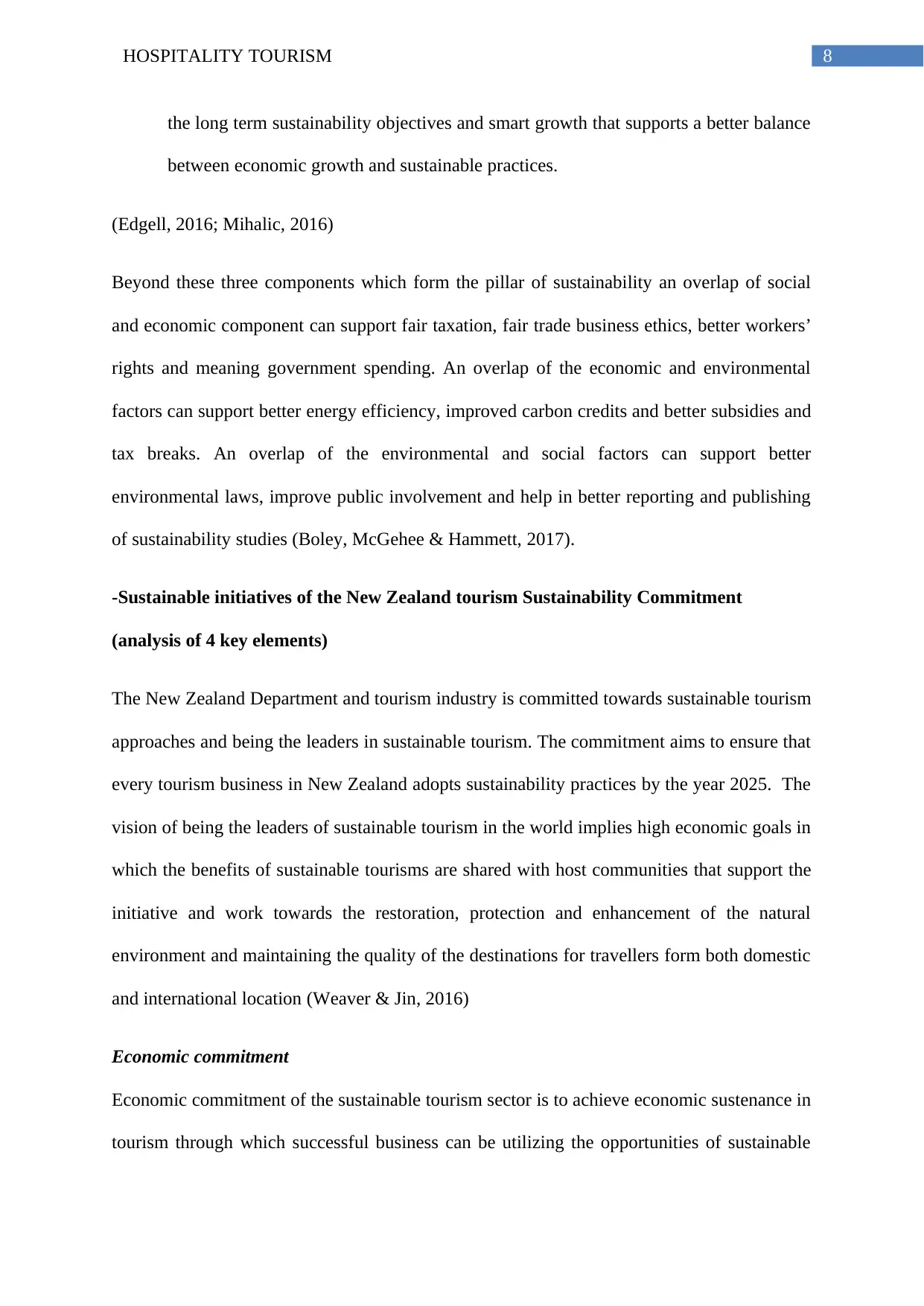
8HOSPITALITY TOURISM
the long term sustainability objectives and smart growth that supports a better balance
between economic growth and sustainable practices.
(Edgell, 2016; Mihalic, 2016)
Beyond these three components which form the pillar of sustainability an overlap of social
and economic component can support fair taxation, fair trade business ethics, better workers’
rights and meaning government spending. An overlap of the economic and environmental
factors can support better energy efficiency, improved carbon credits and better subsidies and
tax breaks. An overlap of the environmental and social factors can support better
environmental laws, improve public involvement and help in better reporting and publishing
of sustainability studies (Boley, McGehee & Hammett, 2017).
-Sustainable initiatives of the New Zealand tourism Sustainability Commitment
(analysis of 4 key elements)
The New Zealand Department and tourism industry is committed towards sustainable tourism
approaches and being the leaders in sustainable tourism. The commitment aims to ensure that
every tourism business in New Zealand adopts sustainability practices by the year 2025. The
vision of being the leaders of sustainable tourism in the world implies high economic goals in
which the benefits of sustainable tourisms are shared with host communities that support the
initiative and work towards the restoration, protection and enhancement of the natural
environment and maintaining the quality of the destinations for travellers form both domestic
and international location (Weaver & Jin, 2016)
Economic commitment
Economic commitment of the sustainable tourism sector is to achieve economic sustenance in
tourism through which successful business can be utilizing the opportunities of sustainable
the long term sustainability objectives and smart growth that supports a better balance
between economic growth and sustainable practices.
(Edgell, 2016; Mihalic, 2016)
Beyond these three components which form the pillar of sustainability an overlap of social
and economic component can support fair taxation, fair trade business ethics, better workers’
rights and meaning government spending. An overlap of the economic and environmental
factors can support better energy efficiency, improved carbon credits and better subsidies and
tax breaks. An overlap of the environmental and social factors can support better
environmental laws, improve public involvement and help in better reporting and publishing
of sustainability studies (Boley, McGehee & Hammett, 2017).
-Sustainable initiatives of the New Zealand tourism Sustainability Commitment
(analysis of 4 key elements)
The New Zealand Department and tourism industry is committed towards sustainable tourism
approaches and being the leaders in sustainable tourism. The commitment aims to ensure that
every tourism business in New Zealand adopts sustainability practices by the year 2025. The
vision of being the leaders of sustainable tourism in the world implies high economic goals in
which the benefits of sustainable tourisms are shared with host communities that support the
initiative and work towards the restoration, protection and enhancement of the natural
environment and maintaining the quality of the destinations for travellers form both domestic
and international location (Weaver & Jin, 2016)
Economic commitment
Economic commitment of the sustainable tourism sector is to achieve economic sustenance in
tourism through which successful business can be utilizing the opportunities of sustainable
⊘ This is a preview!⊘
Do you want full access?
Subscribe today to unlock all pages.

Trusted by 1+ million students worldwide
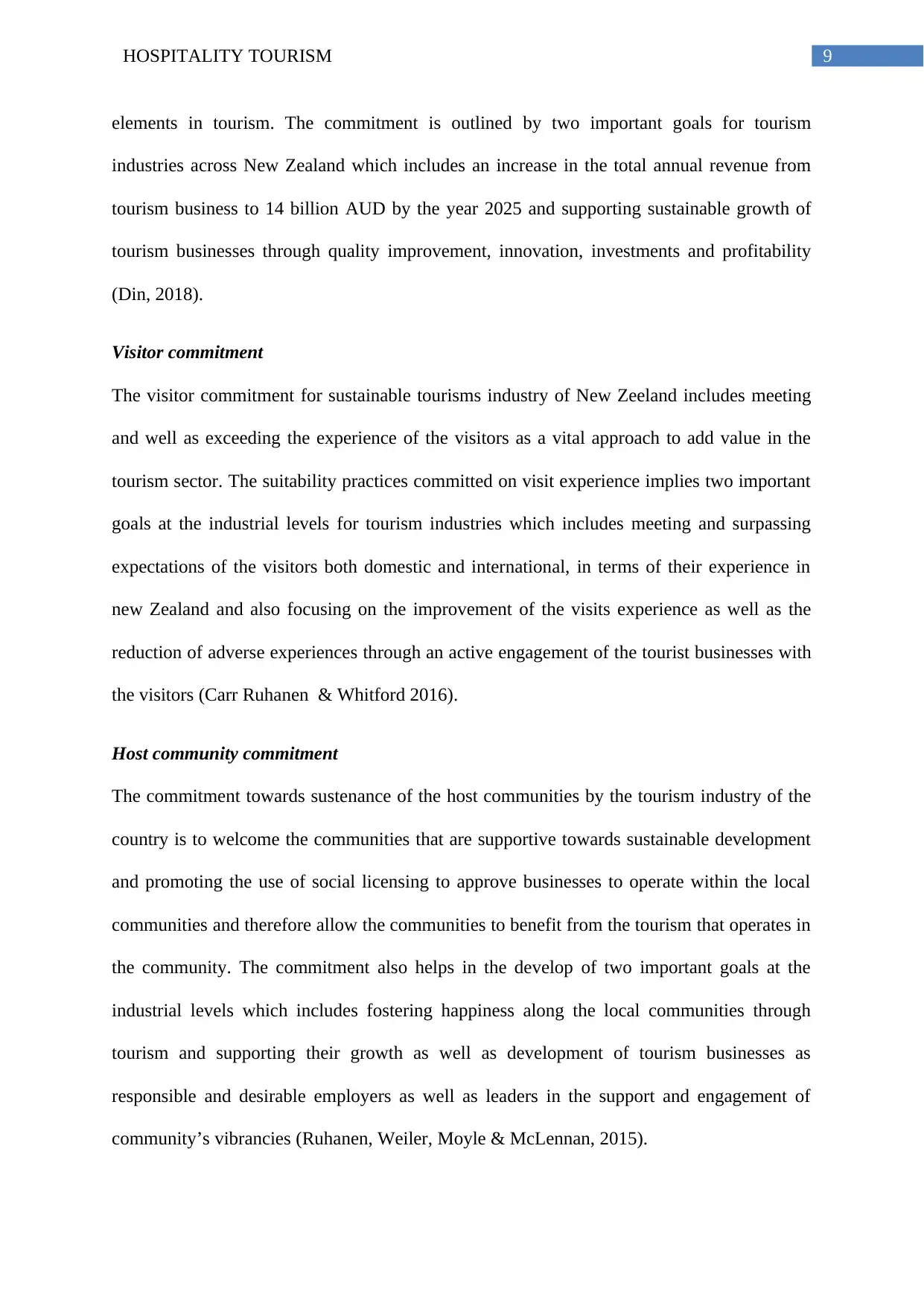
9HOSPITALITY TOURISM
elements in tourism. The commitment is outlined by two important goals for tourism
industries across New Zealand which includes an increase in the total annual revenue from
tourism business to 14 billion AUD by the year 2025 and supporting sustainable growth of
tourism businesses through quality improvement, innovation, investments and profitability
(Din, 2018).
Visitor commitment
The visitor commitment for sustainable tourisms industry of New Zeeland includes meeting
and well as exceeding the experience of the visitors as a vital approach to add value in the
tourism sector. The suitability practices committed on visit experience implies two important
goals at the industrial levels for tourism industries which includes meeting and surpassing
expectations of the visitors both domestic and international, in terms of their experience in
new Zealand and also focusing on the improvement of the visits experience as well as the
reduction of adverse experiences through an active engagement of the tourist businesses with
the visitors (Carr Ruhanen & Whitford 2016).
Host community commitment
The commitment towards sustenance of the host communities by the tourism industry of the
country is to welcome the communities that are supportive towards sustainable development
and promoting the use of social licensing to approve businesses to operate within the local
communities and therefore allow the communities to benefit from the tourism that operates in
the community. The commitment also helps in the develop of two important goals at the
industrial levels which includes fostering happiness along the local communities through
tourism and supporting their growth as well as development of tourism businesses as
responsible and desirable employers as well as leaders in the support and engagement of
community’s vibrancies (Ruhanen, Weiler, Moyle & McLennan, 2015).
elements in tourism. The commitment is outlined by two important goals for tourism
industries across New Zealand which includes an increase in the total annual revenue from
tourism business to 14 billion AUD by the year 2025 and supporting sustainable growth of
tourism businesses through quality improvement, innovation, investments and profitability
(Din, 2018).
Visitor commitment
The visitor commitment for sustainable tourisms industry of New Zeeland includes meeting
and well as exceeding the experience of the visitors as a vital approach to add value in the
tourism sector. The suitability practices committed on visit experience implies two important
goals at the industrial levels for tourism industries which includes meeting and surpassing
expectations of the visitors both domestic and international, in terms of their experience in
new Zealand and also focusing on the improvement of the visits experience as well as the
reduction of adverse experiences through an active engagement of the tourist businesses with
the visitors (Carr Ruhanen & Whitford 2016).
Host community commitment
The commitment towards sustenance of the host communities by the tourism industry of the
country is to welcome the communities that are supportive towards sustainable development
and promoting the use of social licensing to approve businesses to operate within the local
communities and therefore allow the communities to benefit from the tourism that operates in
the community. The commitment also helps in the develop of two important goals at the
industrial levels which includes fostering happiness along the local communities through
tourism and supporting their growth as well as development of tourism businesses as
responsible and desirable employers as well as leaders in the support and engagement of
community’s vibrancies (Ruhanen, Weiler, Moyle & McLennan, 2015).
Paraphrase This Document
Need a fresh take? Get an instant paraphrase of this document with our AI Paraphraser
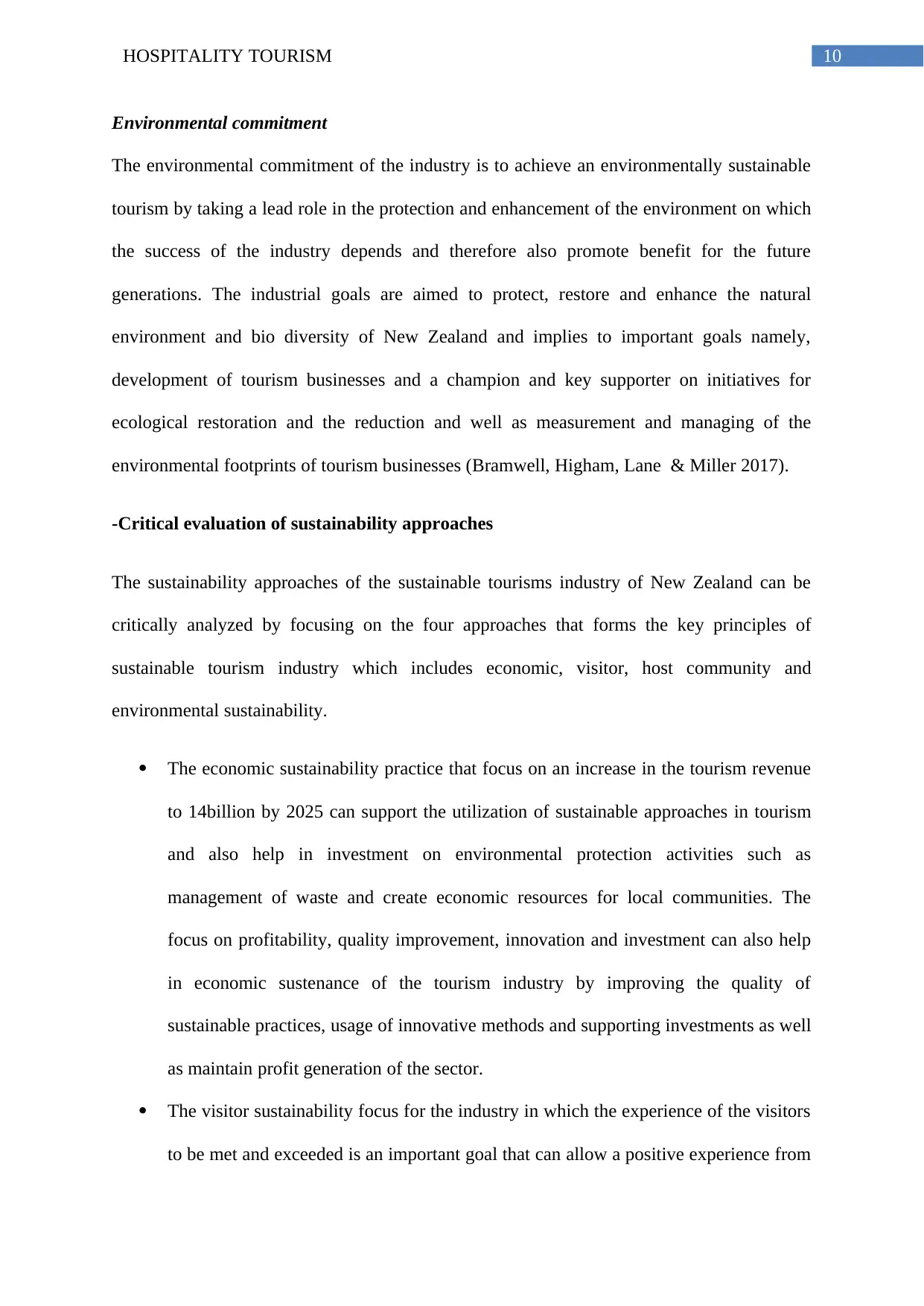
10HOSPITALITY TOURISM
Environmental commitment
The environmental commitment of the industry is to achieve an environmentally sustainable
tourism by taking a lead role in the protection and enhancement of the environment on which
the success of the industry depends and therefore also promote benefit for the future
generations. The industrial goals are aimed to protect, restore and enhance the natural
environment and bio diversity of New Zealand and implies to important goals namely,
development of tourism businesses and a champion and key supporter on initiatives for
ecological restoration and the reduction and well as measurement and managing of the
environmental footprints of tourism businesses (Bramwell, Higham, Lane & Miller 2017).
-Critical evaluation of sustainability approaches
The sustainability approaches of the sustainable tourisms industry of New Zealand can be
critically analyzed by focusing on the four approaches that forms the key principles of
sustainable tourism industry which includes economic, visitor, host community and
environmental sustainability.
The economic sustainability practice that focus on an increase in the tourism revenue
to 14billion by 2025 can support the utilization of sustainable approaches in tourism
and also help in investment on environmental protection activities such as
management of waste and create economic resources for local communities. The
focus on profitability, quality improvement, innovation and investment can also help
in economic sustenance of the tourism industry by improving the quality of
sustainable practices, usage of innovative methods and supporting investments as well
as maintain profit generation of the sector.
The visitor sustainability focus for the industry in which the experience of the visitors
to be met and exceeded is an important goal that can allow a positive experience from
Environmental commitment
The environmental commitment of the industry is to achieve an environmentally sustainable
tourism by taking a lead role in the protection and enhancement of the environment on which
the success of the industry depends and therefore also promote benefit for the future
generations. The industrial goals are aimed to protect, restore and enhance the natural
environment and bio diversity of New Zealand and implies to important goals namely,
development of tourism businesses and a champion and key supporter on initiatives for
ecological restoration and the reduction and well as measurement and managing of the
environmental footprints of tourism businesses (Bramwell, Higham, Lane & Miller 2017).
-Critical evaluation of sustainability approaches
The sustainability approaches of the sustainable tourisms industry of New Zealand can be
critically analyzed by focusing on the four approaches that forms the key principles of
sustainable tourism industry which includes economic, visitor, host community and
environmental sustainability.
The economic sustainability practice that focus on an increase in the tourism revenue
to 14billion by 2025 can support the utilization of sustainable approaches in tourism
and also help in investment on environmental protection activities such as
management of waste and create economic resources for local communities. The
focus on profitability, quality improvement, innovation and investment can also help
in economic sustenance of the tourism industry by improving the quality of
sustainable practices, usage of innovative methods and supporting investments as well
as maintain profit generation of the sector.
The visitor sustainability focus for the industry in which the experience of the visitors
to be met and exceeded is an important goal that can allow a positive experience from
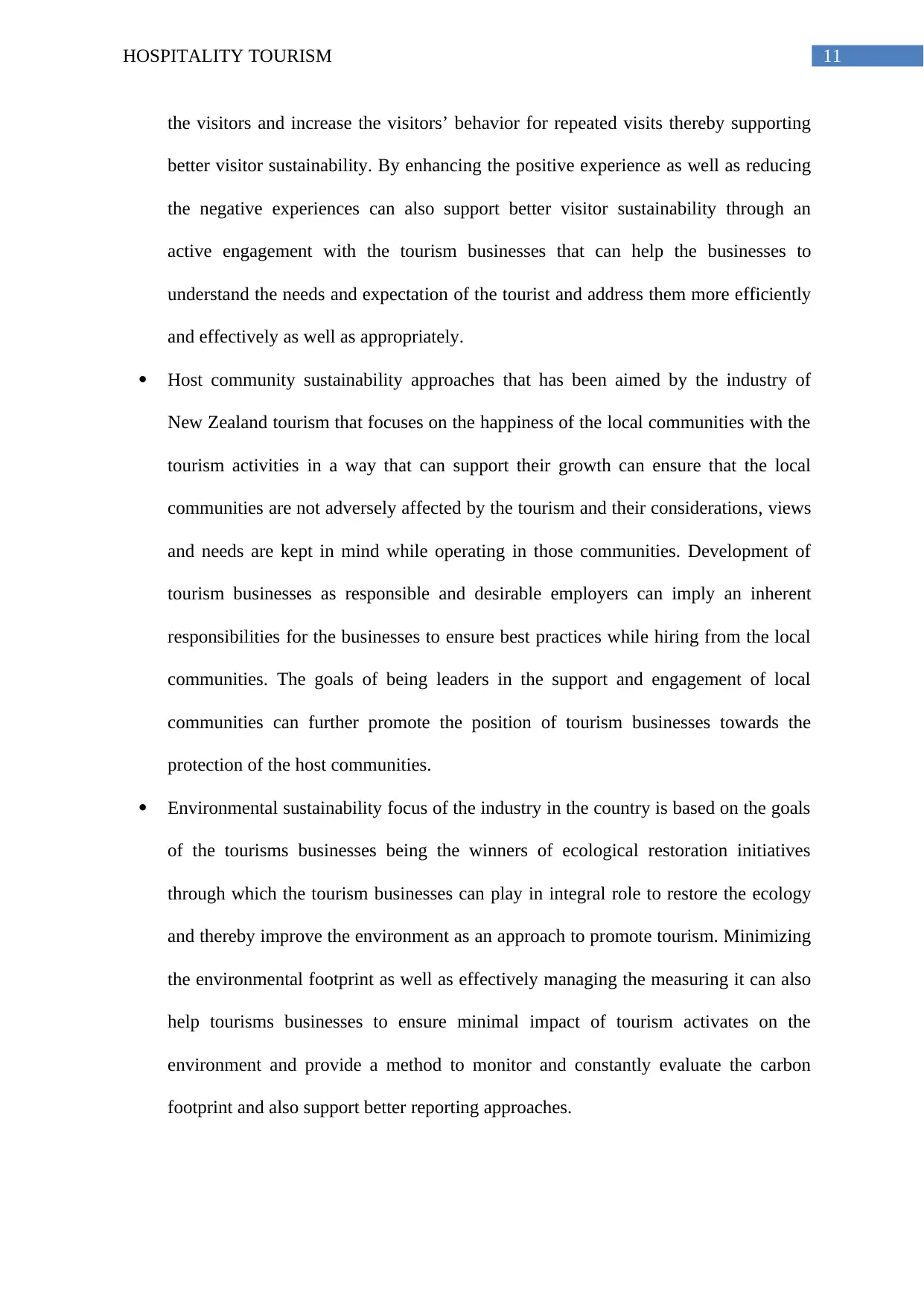
11HOSPITALITY TOURISM
the visitors and increase the visitors’ behavior for repeated visits thereby supporting
better visitor sustainability. By enhancing the positive experience as well as reducing
the negative experiences can also support better visitor sustainability through an
active engagement with the tourism businesses that can help the businesses to
understand the needs and expectation of the tourist and address them more efficiently
and effectively as well as appropriately.
Host community sustainability approaches that has been aimed by the industry of
New Zealand tourism that focuses on the happiness of the local communities with the
tourism activities in a way that can support their growth can ensure that the local
communities are not adversely affected by the tourism and their considerations, views
and needs are kept in mind while operating in those communities. Development of
tourism businesses as responsible and desirable employers can imply an inherent
responsibilities for the businesses to ensure best practices while hiring from the local
communities. The goals of being leaders in the support and engagement of local
communities can further promote the position of tourism businesses towards the
protection of the host communities.
Environmental sustainability focus of the industry in the country is based on the goals
of the tourisms businesses being the winners of ecological restoration initiatives
through which the tourism businesses can play in integral role to restore the ecology
and thereby improve the environment as an approach to promote tourism. Minimizing
the environmental footprint as well as effectively managing the measuring it can also
help tourisms businesses to ensure minimal impact of tourism activates on the
environment and provide a method to monitor and constantly evaluate the carbon
footprint and also support better reporting approaches.
the visitors and increase the visitors’ behavior for repeated visits thereby supporting
better visitor sustainability. By enhancing the positive experience as well as reducing
the negative experiences can also support better visitor sustainability through an
active engagement with the tourism businesses that can help the businesses to
understand the needs and expectation of the tourist and address them more efficiently
and effectively as well as appropriately.
Host community sustainability approaches that has been aimed by the industry of
New Zealand tourism that focuses on the happiness of the local communities with the
tourism activities in a way that can support their growth can ensure that the local
communities are not adversely affected by the tourism and their considerations, views
and needs are kept in mind while operating in those communities. Development of
tourism businesses as responsible and desirable employers can imply an inherent
responsibilities for the businesses to ensure best practices while hiring from the local
communities. The goals of being leaders in the support and engagement of local
communities can further promote the position of tourism businesses towards the
protection of the host communities.
Environmental sustainability focus of the industry in the country is based on the goals
of the tourisms businesses being the winners of ecological restoration initiatives
through which the tourism businesses can play in integral role to restore the ecology
and thereby improve the environment as an approach to promote tourism. Minimizing
the environmental footprint as well as effectively managing the measuring it can also
help tourisms businesses to ensure minimal impact of tourism activates on the
environment and provide a method to monitor and constantly evaluate the carbon
footprint and also support better reporting approaches.
⊘ This is a preview!⊘
Do you want full access?
Subscribe today to unlock all pages.

Trusted by 1+ million students worldwide
1 out of 23
Related Documents
Your All-in-One AI-Powered Toolkit for Academic Success.
+13062052269
info@desklib.com
Available 24*7 on WhatsApp / Email
![[object Object]](/_next/static/media/star-bottom.7253800d.svg)
Unlock your academic potential
Copyright © 2020–2026 A2Z Services. All Rights Reserved. Developed and managed by ZUCOL.





